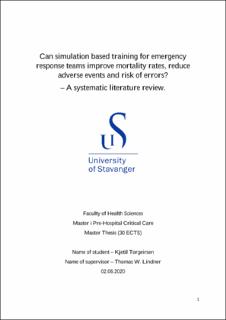| dc.contributor.advisor | Lindner, Thomas | |
| dc.contributor.author | Torgeirsen, Kjetil | |
| dc.date.accessioned | 2021-04-13T11:20:27Z | |
| dc.date.available | 2021-04-13T11:20:27Z | |
| dc.date.issued | 2020-06-02 | |
| dc.identifier.uri | https://hdl.handle.net/11250/2737543 | |
| dc.description | Master's thesis in Pre-hospital critical care | en_US |
| dc.description.abstract | Background:
The objective of this master thesis was to examine the following research question: Can simulation-based training for health care emergency response teams reduce mortality rates, number of adverse events and risk of errors?
Methods:
A systematic literature review based on the PRISMA guidelines was conducted in the following databases: Medline, EMBASE, Epistemonikos, Google Scholar, PubMed, CINAHL and Cochrane. Three reviewers used pre-defined criteria and the Rayyan QRCI© tool to screen the retrieved studies independently for inclusion in the analyses. From those studies the results of simulation-based training according to Kirkpatrick level 4 where extracted. A tool for evaluation of quality of reporting the simulation-based training intervention was developed and applied.
Results:
184 studies have been identified and 33 were further investigated. On the Kirkpatrick level 4 thirty studies (90%) described improvements, while three (9%) found no changes. 19(58%) of the studies were rated 4/7 points or higher for the quality of reporting of the simulation- based training intervention. 18 studies (55%) reported repeated simulation training as part of intervention and reported reduced mortality rates and reduced numbers of adverse events. None of the included studies reported numbers of medical errors.
Conclusion:
The results indicated that simulation based training can reduce mortality and adverse events. Repeated training seemed to increase the possibility for Kirkpatrick level 4 improvements. This systematic review was not able to identify other characteristics of simulation based training that affected patient outcome. | en_US |
| dc.language.iso | eng | en_US |
| dc.publisher | University of Stavanger, Norway | en_US |
| dc.relation.ispartofseries | Masteroppgave/UIS-HV/2020; | |
| dc.rights | Attribution-NonCommercial-NoDerivatives 4.0 Internasjonal | * |
| dc.rights.uri | http://creativecommons.org/licenses/by-nc-nd/4.0/deed.no | * |
| dc.subject | helse- og sosialfag | en_US |
| dc.subject | PHCC | en_US |
| dc.subject | akuttmedisin | en_US |
| dc.subject | akuttmedisinske team | en_US |
| dc.subject | simulering | en_US |
| dc.subject | simulation based training | en_US |
| dc.subject | simuleringsbasert trening | en_US |
| dc.title | Can simulation based training for health care emergency response teams improve mortality rates, reduce number of adverse events and risk of errors? A systematic literature review. | en_US |
| dc.title.alternative | Kan simuleringsbasert trening for akuttmedisinske beredskaps team – øke overlevelse og redusere antall uønskede hendelser og risiko for behandlingsrelaterte feil? En systematisk gjennomgang av litteratur | en_US |
| dc.type | Master thesis | en_US |
| dc.subject.nsi | VDP::Medisinske Fag: 700::Klinisk medisinske fag: 750::Traumatologi: 783 | en_US |

